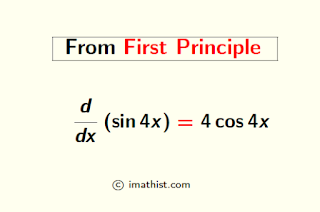The derivative of sin4x is equal to 4cos4x. In this post, we will find the derivative of sin4x by the first principle, that is, by the limit definition of derivatives.
The limit definition (i.e., first principle) of derivatives tells us that the derivative of a function f(x) is given by the following limit:
$\dfrac{d}{dx}(f(x))$$=\lim\limits_{h\to 0} \dfrac{f(x+h)-f(x)}{h}$ …(I)
Derivative of Sin4x by First Principle
Question: What is the derivative of $\sin 4x$?
Answer: The derivative of sin4x is 4cos4x.
Explanation:
Step 1: We put $f(x)=\sin 4x$ in the above formula (I).
Step 2: Thus the derivative of sin4x by the first principle will be equal to
$\dfrac{d}{dx}(\sin 4x)$$=\lim\limits_{h\to 0} \dfrac{\sin4(x+h)-\sin 4x}{h}$
Step 3: Applying the formula $\sin a -\sin b$ $=2\cos \frac{a+b}{2}\sin \frac{a-b}{2}$, we obtain that
$\dfrac{d}{dx}(\sin 4x)$$=\lim\limits_{h\to 0} \dfrac{1}{h} \cdot 2 \cos \dfrac{8x+4h}{2}\sin \frac{4h}{2}$
= $\lim\limits_{h \to 0} \frac{2}{h} \cdot \cos(4x+2h) \cdot \sin 2h$
= $4\lim\limits_{h \to 0} \cos(4x+2h)$ $\times \lim\limits_{h \to 0} \dfrac{\sin 2h}{2h}$
[Let $z=2h$. Then $z \to 0$ as $h \to 0$]
= $4 \cos(4x+0)$ $\times \lim\limits_{z \to 0} \dfrac{\sin z}{z}$
= $4 \cos4x \cdot 1$ as the limit of sinx/x is 1 when x tends to zero.
= $4\cos 4x$.
Conclusion: Thus, the derivative of sin4x is 4cos4x, obtained by the first principle of derivatives.
RELATED TOPICS:
Question-Answer on Derivative of Sin4x
Question: Find the derivative of sin4x at x=0.
Answer:
From the above, we know that the derivative of sin4x is 4cos4x. Thus, the derivative of sin4x at x=0 is equal to
$[\dfrac{d}{dx}(\sin 4x)]{x=0}$
$=[4\cos 4x]{x=0}$
$=4\cos 0$
$=4 \cdot 1$ as the value of cos0 is 1.
$=4$.
So the derivative of sin4x at x=0 is equal to 4.
FAQs
Q1: What is the derivative of sin4x?
Answer: The derivative of sin4x is 4cos4x.
